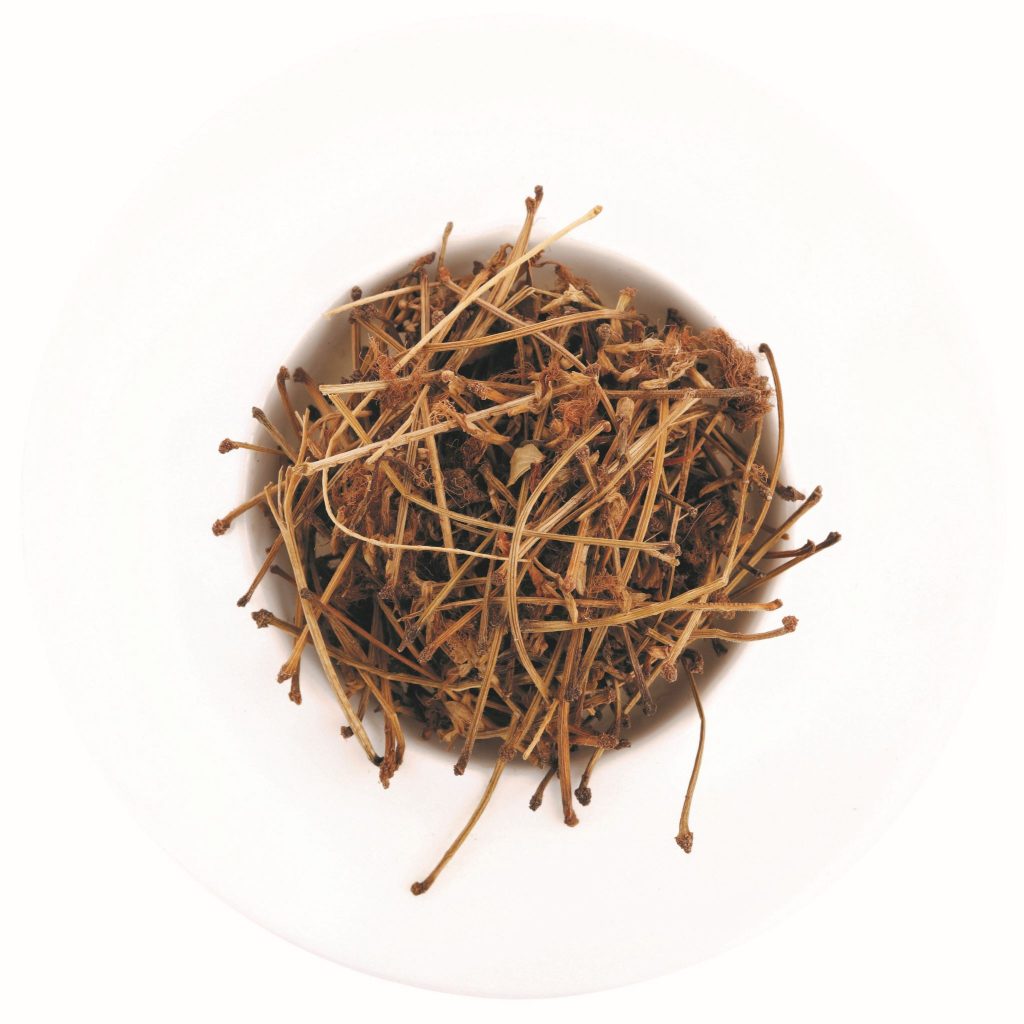Albizia Flower

What is Albizia Flower?
Albizia Flower (he huan hua, 合欢花) comes from the Albizia Tree, which is also known as the Persian Silk Tree, Pink Silk Tree, Chinese Silk Plant or Mimosa. As the leaves of this tree slowly close during night time and during periods of rain, this plant is also called “Night Sleeper”.
A small tree that grows up to 16 – 52 feet tall, it can grow fluffy, thread-like flowers that are usually pink or whitish pink in colour, and they burst like fireworks when in bloom. Albizia Flowers have a very fragrant scent that will attract many bees and butterflies.
These Albizia Flowers are native to Iran, China and Korea, but can be found in other regions such as Australia, Africa, Madagascar and America. To ensure high quality, Albizia Flowers are usually harvested in the late Summer and early Autumn when they bloom, and then later dried for use.
In Traditional Chinese Medicine (TCM), Albizia Flower falls under the category of ‘Herbs that nourish the Heart and calm the Spirit’. Neutral in nature and sweet in taste, this herb tends to slow down acute reactions and detoxify the body. It also has a tonic effect on the body as it can replenish qi and blood. In particular, Albizia Flower targets the Heart and Liver.
Functions and Benefits of Albizia Flower
Traditional Chinese Medicine (TCM) shows that Albizia Flower has the following health benefits.
Albizia Flower can induce tranquilization by calming the spirit and promoting the movement of Liver qi. It can thus help to treat insomnia, forgetfulness, irritability, excessive emotions and depression. It can even help to relieve stomach discomfort or pressure on the chest caused by excess worry and emotions.
Albizia Flower can also promote the movement of blood to relieve pain such as back pain, trauma, bruising and injuries from falls. The herb can also clear one’s eyes to relieve blurred vision, eye redness and pain caused by Wind-Heat.
This herb is also used to dissipate swellings that are caused by traumatic injuries such as fractures, as well as to reduce swellings and abscesses on the skin and in the abdominal region.
This herb can also clear Heat to stop coughing and wheezing in Ayurveda Medicine, where it is used for symptoms such as bronchitis and asthma.
Modern studies have also suggested that Albizia Flower can offer neuroprotection by protecting our brains from free radicals that may lead to diseases such as Alzheimer’s, dementia and Parkinson’s. It can also help to increase focus and attention, which leads to better memory and learning.
Other than that, Albizia Flower can also provide quick relief for certain allergies, speed up digestion, promote bowel movements, lower cholesterol levels to prevent heart diseases, prevent cancer, and to reduce skin problems such as rashes and acne.

How to Use Albizia Flower
The recommended daily dosage of Albizia Flower is 9 – 15g, if taken with water as a decoction. Albizia Flower can also be ground into paste or poultice to be applied to the skin.
Both fresh and dried Albizia Flower can be found in many Asian markets and specialty stores. High quality Albizia Flowers are highly aromatic, so do look out for the most fragrant ones when you shop for them!
Many individuals choose to brew this herb in hot water to enjoy Albizia Flower Tea benefits. While whole flowers are preferable if you want to brew them into tea, some herbal stores also sell extracts, infusions, powders and other forms of health supplements that contain Albizia Flower.
If you are not used to the strong taste of Albizia Flower, you can try adding honey or sugar into your cup of tea.
Cautions and Side Effects of Albizia Flower
Albizia Flower should be used with caution by individuals who are experiencing pregnancy, Yin Deficiency or body fluid impairment.
Also, if you are currently taking antidepressants, do not use Albizia Flower as an alternative to it to stop taking them. Do check with your healthcare provider before adding Albizia Flower to your diet, and always start with a low dose before asking your doctor if you can adjust to a larger dose.
Last but not least, while the herb does not appear to cause drowsiness or affect judgment, some practitioners recommend that patients should not drive or operate heavy construction an hour after taking the herb.
Summary
Here is a summary for Albizia Flower:
- Herb name (Chinese): 合欢花
- Herb name (Pin Yin): hé huān huā
- Herb name (English): Albizia Flower
- Herb name (Botanical): Flos Albiziae
- Origin of species: Albizia julibrissin Durazz.
- Part(s) of herb used: Inflorescence or bud
- Geo-specific habitat(s): Regions along the flow of Yangtze River
- Taste(s) & Properties: Sweet; Neutral; Administrates the Heart and Liver meridians
- Actions: Eases symptoms of insomnia, emotional distress and forgetfulness
References
Farag, M., El Gamal, A., Kalil, A., Al-Rehaily, A., El Mirghany, O., & El Tahir, K. (2013). Evaluation of some biological activities of Albizia lebbeck flowers. Pharmacology & Pharmacy, 4(6), 473.[Accessed on 15 October 2022]
Kokila, K., Priyadharshini, S. D., & Sujatha, V. (2013). Phytopharmacological properties of Albizia species: a review. Int J Pharm Pharm Sci, 5(3), 70-73. [Accessed on 15 October 2022]
Share this article on
